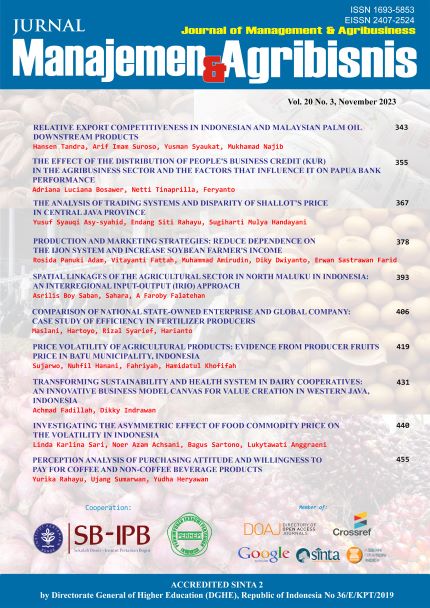The Effect of Distribution of People's Business Credit (KUR) in The Agribusiness Sector and The Factors That Influence It on Papua Bank Performance
Abstract
Bank Papua is a financial institution that distributes KUR in Papua and West Papua. However, the KUR agribusiness sector of Bank Papua has decreased from year to year. Therefore, this study aims to determine the effect of KUR on the agribusiness sector and the factors that affect the performance of Bank Papua. Secondary data comes from Bank Papua, BPS Papua and West Papua. The data were processed and analyzed using multiple linear regression with the Ordinary Least Square (OLS) approach to determine the real effect of the independent variables on the dependent variable. The results showed that KUR in the agribusiness sector, loan deposit to ratio, net interest margin, and the conditions of the COVID-19 pandemic were not significant, while operating expenses on operating income had a significant effect on return on assets. Bank Papua must be more efficient in carrying out its business activities by reducing operational costs and increasing operating income, one of which is by increasing KUR distribution in the agribusiness sector as an economic sector that absorbs potential labor and is a sector that can withstand shocks. Operating expenses on operating income that have a negative effect on the return on assets indicates that Bank Papua is not efficient in running its business because it suffers losses. This will have an impact on decreasing credit, especially KUR in the agribusiness sector as an economic sector that is classified as high risk. This is due to its perishable nature and seasonality, thereby hampering the government's goal of developing the potential of Papua and West Papua to improve the welfare and economy of the community.
Keywords: agribusiness potential, KUR agribusiness sector, Papua Bank performance, regression multiple linear
Authors
Authors who publish with this journal agree to the following terms:
- Authors retain copyright and grant the journal right of first publication with the work simultaneously licensed under a Creative Commons Attribution License that allows others to share the work with an acknowledgement of the work's authorship and initial publication in this journal.
- Authors are able to enter into separate, additional contractual arrangements for the non-exclusive distribution of the journal's published version of the work (e.g., post it to an institutional repository or publish it in a book), with an acknowledgement of its initial publication in this journal.
- Authors are permitted and encouraged to post their work online (e.g., in institutional repositories or on their website) prior to and during the submission process, as it can lead to productive exchanges, as well as earlier and greater citation of published work (See The Effect of Open Access).

